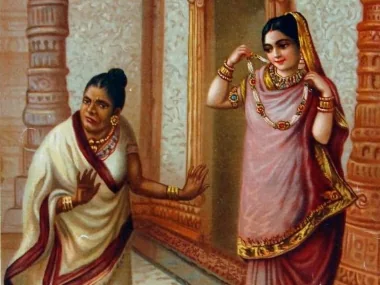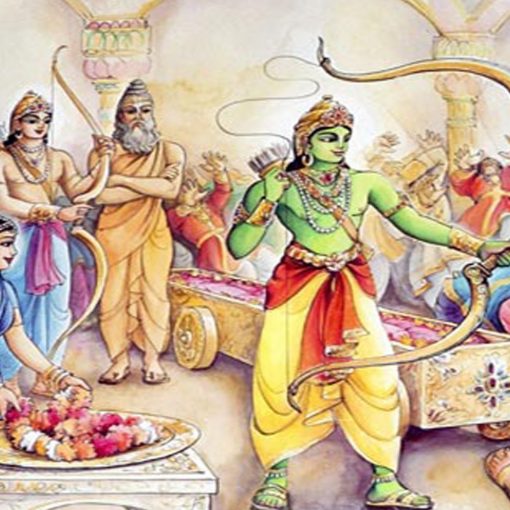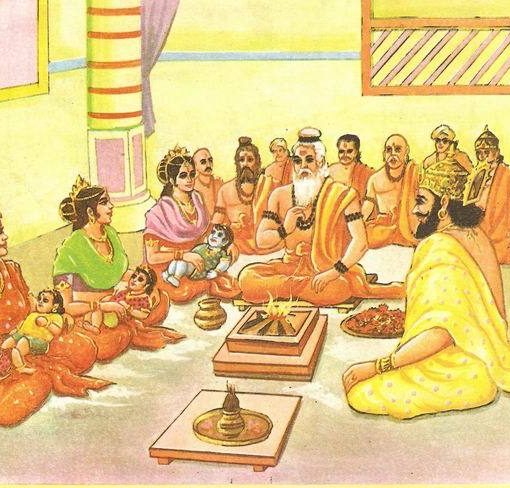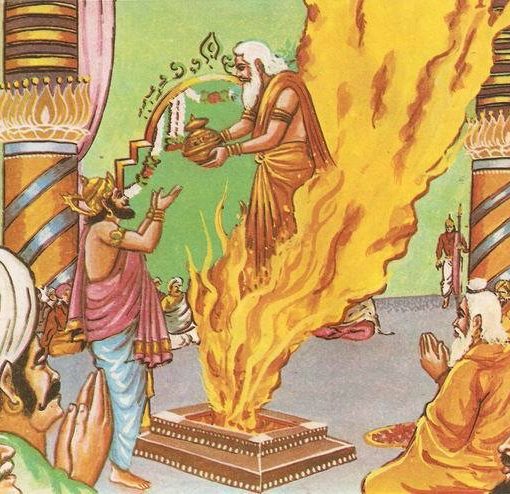The demon again mounted the Pushpaka, which was stationed in the sky. Not being interested in pillaging the paltry wealth of a human city, he left and soared up into the heavens. Perhaps there were some gods around who could put up a better fight.
Rāvaṇa went up to the heavenly planets inhabited by the principal gods. But the gods swiftly ran away, unwilling to encounter him in battle. They knew of the inviolable boons of Brahmā. It was pointless fighting the demon. The gods prayed to Viṣṇu, hiding themselves in fear.
Rāvaṇa decided to rest for a while in heaven. He went to Amarāvatī, the city of Indra, king of the gods. As the Rākṣasa was seated in the celestial Nandana gardens, he saw an Apsarā, a heavenly nymph, named Rambha. The face of that celestial girl shone with incomparable beauty and she was adorned with bright garlands and jewels. Her soul-captivating eyes glanced here and there and her fleshy hips swayed as she moved. Rāvaṇa gazed upon her large round breasts and shapely thighs. Her hands, soft like rose petals, pulled her shining blue dress tight around her body as she saw the demon staring at her.
Rāvaṇa assumed a godly form of great splendor, concealing his terrible ten-headed body. He sprang to his feet and quickly went over to Rambha, immediately taking her by the hand. Completely overcome by lust, he smiled at the celestial girl. “Where do you go and whose are you, lovely lady?” he asked. “Who will today enjoy the nectar of your soft, red lips? Who will be blessed by the touch of your tender breasts? Which fortunate man will lie tightly embraced by you, his mind completely captured by carnal delights?”
Rāvaṇa was not at all concerned whether she was married or not. He had stolen the wives of gods, Gandharvas and demons everywhere, taking them to Lanka to join his harem. The Rākṣasa was accustomed to having his way and spoke only in an attempt to win over Rambha. He praised her divine beauty and told her of his own power and glory. What woman would refuse the opportunity to become the consort of the mighty Rāvaṇa?
But the beautiful girl did not reciprocate his advances. She pulled away from him, her bright bracelets falling to the ground as she wrested herself from Rāvaṇa’s grasp. Folding her palms and looking down, she addressed the Rākṣasa reproachfully. “Please do not speak in this way. I am as good as your daughter and I therefore deserve to be protected by you, O Rāvaṇa. Indeed I am the wedded wife of another.”
Rambha told him she was married to a god, Nalakuvara, who was the son of Kuvera, Rāvaṇa’s own brother. She was thus related to Rāvaṇa and he should not make amorous advances towards her.
Rāvaṇa laughed loudly. He had no regard whatsoever for any moral codes. He moved towards Rambha who ran behind a golden bush. Rāvaṇa pursued her, pulling off his red silk robes and revealing his immense, lustrous body. The maiden tried to evade him, dodging here and there with her garland and necklaces swinging, but it was useless. Taking hold of Rambha the Rākṣasa forcibly laid her across a nearby rock. He snatched off her garments and began ravishing her, his eyes expanded in delight. Rambha cried out for help, but seeing the fierce Rākṣasa no one dared intervene. The demon’s powerful hands pinned the white arms of the maiden against the rock. Her dark hair fell in disarray, its golden clasps and flowers dislodged. Rāvaṇa violently molested her in front of his demon followers. Although she begged him to desist, the Rākṣasa took that struggling heavenly girl against her desire.
After Rāvaṇa had sated his lust he stood up, fastening his waist cloth. Shedding tears, Rambha backed away from the demon and fled. Her clothes torn and her garlands crushed, she went before her husband. When he saw her in that condition Nalakuvara became infuriated. But when he heard it was Rāvaṇa who had raped her, he felt helpless. The demon had already defeated Nalakuvara’s powerful father, who was supported by innumerable Yakṣa warriors. There was no possibility of facing Rāvaṇa in a fight. Nalakuvara considered the situation carefully. Although he could not fight the demon, he could at least curse him as a result of his evil act. The righteous curses of the gods invoked the infallible power of Viṣṇu. Considering this the only means of punishing Rāvaṇa, Nalakuvara touched holy water and then uttered his imprecation.
“This evil Rākṣasa has violated a celestial lady. If he ever again rapes another maiden he will immediately fall dead.”
Rāvaṇa soon heard of that curse. He had seen such curses, made by gods and ṛṣis, come to pass many times. Once uttered they could not be retracted. Although he did not like to accept it, Rāvaṇa could understand that some powerful force maintained the universal order and laws. Thinking it possible that Nalakuvera’s words might just be effective, he decided not to again force himself upon another female. Better not to take any chances. After all, there were enough women who would willingly accept him.





